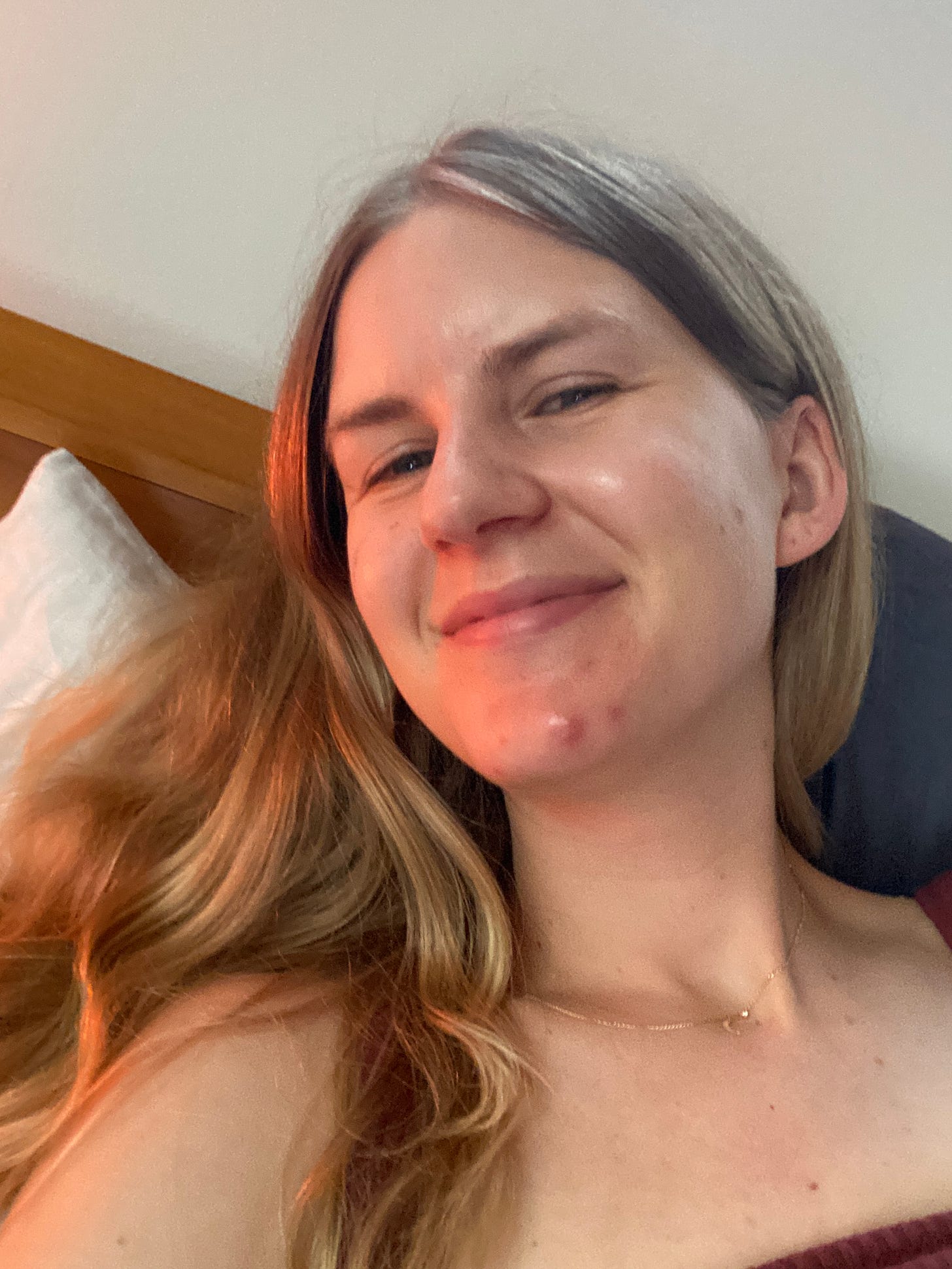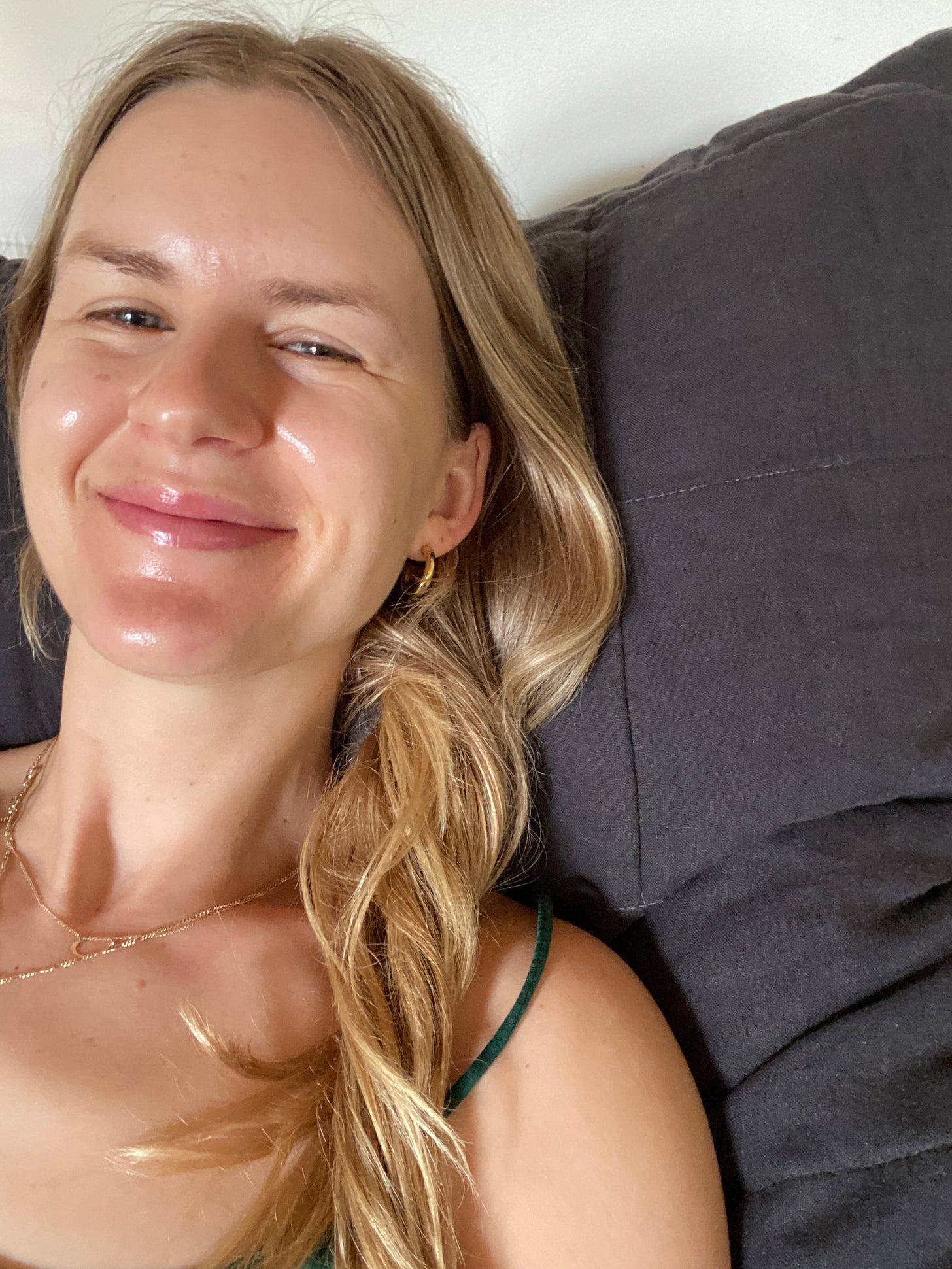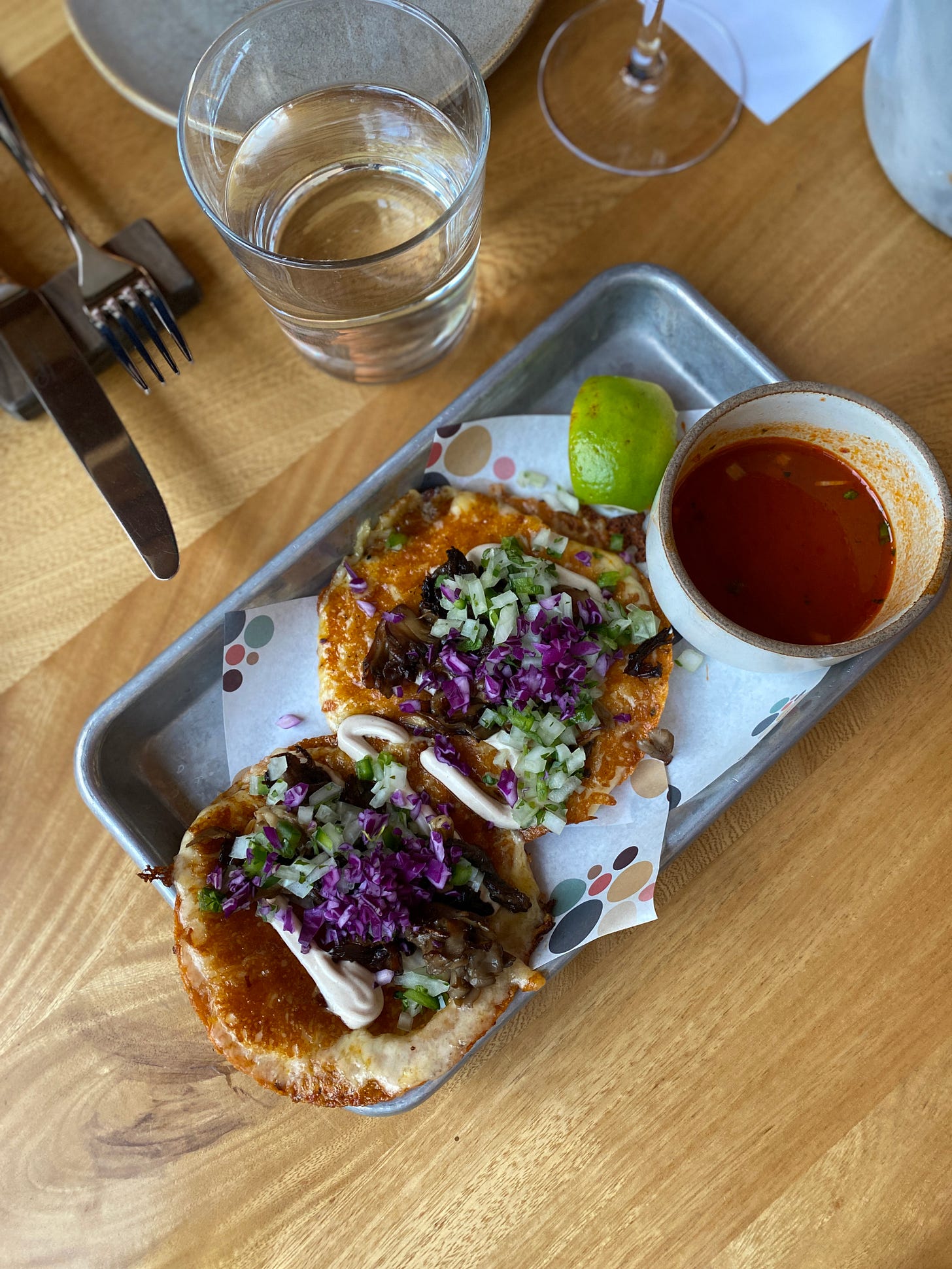#32. I Stopped Washing My Face
How 30 days without my skincare routine somehow helped me through a career crisis
I’ve had sensitive, easily irritated skin for as long as I can remember. Even when I was a kid and didn’t have the slightest inkling of how many skincare products I would eventually try in my 20s and 30s, my skin would always react to things in my environment–mosquito bites, -30˚ Minnesota wind in February, sunshine beating down on me during a summer soccer tournament, and poison ivy from the woods surrounding the house I grew up in–more harshly than my friends. My mom also has famously sensitive skin, so I’d like to think it’s just genetic. Her skin is so reactive that she uses almost nothing on it other than daily SPF, ultra-gentle cleanser, lotion, and a few choice cosmetics here and there. At 67, she often gets comments that she looks “young for her age.”
Earlier this year, I came across the work of Jessica DeFino–a former beauty editor who now writes the super successful and thought-provoking newsletter
–and became borderline obsessed with the idea that “less is best” when it comes to beauty and skincare. I devoured her articles on why the beauty industry is actually pretty fucking terrible, and marketing/capitalism is hugely responsible for making people feel bad about their appearances (which they then need products to “fix.”)This was around the same time I was starting to have a post-pandemic fueled crisis of conscience as a person who has spent the last 16+ years focused on a career in marketing and has somewhat inadvertently dedicated my professional life to selling things (?????), and I clung to Jessica’s work like a life raft. She worked in the beauty industry for years, but found a way out. Now she writes what she wants and when–all the articles that she could never pitch while still working in the industry–and doesn’t have to “sell things” to make a living (in fact, she kind of does the opposite). To me, her work feels important on a societal level. Though I’m not a full-time writer (I’m a marketing director in the retail/lifestyle/jewelry industry, if you didn’t know that!), I still found her story really fucking inspirational.
This newsletter is a place for my most “unpublishable” pitches: the beauty-critical content that publications can’t, won’t, or don’t cover — whether that’s to appease advertisers, preserve brand relationships, or cling to the conventional wisdom, outdated ideals, and marketing myths that keep consumers consuming. Trust me, it all influences what information makes it to the mainstream. – Jessica DeFino
It wasn’t long after discovering The Unpublishable–which made me start to feel very differently about product marketing, even if I don’t work in the beauty industry–that I started seeing a career therapist. (Well, Claire is really just a regular therapist who happens to have an interest in helping people talk through their careers). My journey with Claire and where it has led me so far is a topic for a different issue (soon!), but trust me when I say that I was in the mood to experiment or make a change of some kind this spring, even if it was just what I was putting on my own face.
In March, I read Jessica DeFino’s 2022 piece for Slate: “Your Skin Doesn’t Need Skincare” just shy of a million times. The thesis is right there in the title: Skincare products are largely unnecessary, and your skin can do everything it needs on its own without the help from any products or beauty brands that promise to make us look younger, healthier, more awake, etc. The article implies that despite what beauty marketing tells us about what certain products can do for our skin or appearance, or how they can make us feel, we don’t actually need all of that shit. Given my frame of mind at the time–when I was genuinely starting to wonder if all product marketing is inherently evil–I devoured the article with wide eyes and almost immediately committed to taking action.
At the very end of the piece, she wrote:
Giving up (most of) your skin care can seem scary, but it doesn’t mean giving up “good skin.” After a 28-day cycle sans products, your microbiome will repopulate, your skin’s inherent functions will reregulate, and you’ll likely find you never needed 10 steps, or five, or even two.”
So I decided to give it a try.
At the very end of March, I had finally run out of the face wash I had been using that promised to fight acne, remove excess oil, and “normalize my pores.” I had never particularly known if it was doing any of those things and wasn’t convinced I should buy it again, so I decided that was clearly a sign it was time to try cutting down my skincare routine to virtually nothing for an entire month to see what would happen.
I spent the entire month of April paring down my skincare routine so far that I wasn’t even washing my face (at least not with cleanser). I stuck with just a splash of water in the morning (which I’ve been doing as long as I’ve been old enough to wash my own face I guess) and a more thorough rinse with water at night after removing my makeup (if I wore any that day) with a small amount of jojoba oil, like the article suggests. And that’s it. I tried to go pretty light on makeup for the entire month, too. In total, I stopped using seven products:
My beloved chemical exfoliant that completely got rid of the non-hormonal acne on my cheeks that started when I moved to Minnesota last year
An over-the-counter (i.e. very mild) retinoid that’s kept my hormonal acne at bay since it entered the building when I was 28
A custom Curology prescription that supposedly fights acne and works to fade acne scars
My favorite not-fancy lotion that keeps my face from ever feeling tight, that I’ve been using for 6+ years
A maximum strength benzoyl peroxide gel that I used to treat acne flare-ups (when I need it)
An acne-fighting gel cleanser I had been using for just over a year
A topical steroid (not even found in the beauty aisle) that works to shrink hormonal acne spots
And for the first few days sans products, nothing happened. I was shocked! It was exciting and validating to see that everything I had been reading was seemingly working (I, of course, binge-read a bunch of articles from other people who stopped washing their faces to see what the results were; it varied, but they were mostly success stories). I was already looking forward to the money I would save on skincare products, and wondering what the whole thing meant for me as a marketer. Had I fed into all the bullshit the beauty industry was selling to me? Was it all just an illusion?
But after five days with no products, my acne started coming back. Just one small spot, at first, then another. Ten days in, I had a large, painful spot under my left eye that hurt even when I wasn’t touching it. Soon, I was feeling like I couldn’t leave the house without makeup on due to all the little irritations popping up on my cheeks and chin; the two places on my face I had worked so hard to help in the past. I focused on getting sleep, drinking more water, and trying (kinda) to eat better to see if that would help. I avoided dairy (a known acne trigger) like the plague. But it only got worse.

On day 30, I gave up. My skin wasn’t the worst it had been since I overhauled my skincare routine over a year ago (see photo above), but it wasn’t great, and I couldn’t handle it anymore. I kind of held my breath around day 28–hoping that maaaaaybe I’d start to see a total skin “regeneration” after that; like a magic wand that would suddenly clear up my skin completely and prove that maybe it had to get worse before it could get better–but the only change I saw was yet another tiny zit pop up in the crease of my nose. On day 31, I may have let slip an audible sigh when I bathed my face in my tried-and-true chemical exfoliant and moisturizing lotion cocktail for the first time in a month.
The failure of my 30 day no-skincare experiment had a strange effect on my mental state. I was weirdly… happy about it?
Maybe I didn’t follow the instructions perfectly–I didn’t go 28 days *completely* product free like I guess maybe I was supposed to–but I did pare down my skincare routine to almost nothing in an effort to try to be more aware of what I was putting on my face and why. The fact that getting rid of all my skincare products pretty swiftly brought my acne back felt weirdly validating. I wasn’t being sold a lie! At least, not entirely! I used all these products for a very specific reason: I don’t like having acne. It’s painful, it makes me spend a lot more time getting ready and caring about my appearance, and it hurts my self esteem (that’s the part that industrialized beauty has played a huge part in; I’m aware). I’m not looking for “perfect” skin. I’m just looking to be able to run out the door without really paying that close attention to what I look like and feel good about myself, and acne prevents me from doing that. A very classic products-as-solution scenario.
It took my skin a few weeks to totally clear up, but I started noticing improvements after just a few days of using my old skincare products again.
The very first thing I did when I decided to end the experiment was a deep-dive into all the products I had set aside to decide which ones to go back to using, and which to replace or remove from my skincare routine entirely. I did research on every ingredient in every bottle and felt like I was so much more well-informed about what I had been using before.
The biggest change I made was picking a super gentle, non-stripping cream cleanser specifically made for sensitive skin that would act more as a makeup remover than a traditional “face wash.” I did a ton of research and decided Middlemist Seven would be right for me, and I absolutely love it. (Or rather, my acne-prone, naturally very sensitive skin does). I also reached out to my Curology provider about removing the antibacterial ingredient in my custom formula and she basically said it wouldn’t be possible, so I canceled my prescription. Six weeks after the conclusion of the experiment, my skin genuinely looks better than ever. Not “perfect,” but that was never the goal.

Temporarily getting rid of my skincare routine helped me realize a few things. First, that product marketing isn’t inherently bad. (Thank god). Marketing, at its best, is about connecting people with products that will help them solve problems, or live better, easier, or more productive lives. Marketing at its worst–when it’s hawking shitty, irresponsibly made products or supporting harmful narratives that society and greedy corporations are responsible for upholding–can be evil, but that doesn’t always mean that it is. I realize that the problem with the beauty industry is that it makes people (mainly women) feel like they have problems to solve at all. But that’s also a direct reflection of the world we live in; the beauty industry didn’t make it up. Maybe we (I?) can simultaneously work to dismantle systems of oppression and societal views that are harmful or unproductive, while also continuing to use products that make us feel good, become more informed consumers, and understand why the use of certain products makes us feel certain ways. She’ll say it better than I can, so I’ll quote Jessica DeFino again from an interview in my friend Leslie’s newsletter,
:I don't think a "middle ground" can exist but I do think these two things can and do co-exist. Industrialized beauty is inherently problematic. People are going to consume it anyway. I do think, though, that being honest and open and explicit about the former, over time, discourages the latter.
Here are my biggest takeaways from getting rid of my skincare routine in a (strange?) effort to try to understand my career a little better:
The “no skincare” routine I tried didn’t work for me specifically, but I may try again in the future with a true 28-day no products of any kind angle and see what happens. It may work for you if you see value in trying it, though!
All marketing for consumer products isn’t inherently bad, meaningless, or unproductive–some problems, like acne, can be solved with products–and that isn’t necessarily a bad thing on an individual level (wanting to solve a “problem” in the first place that we’ve only been told by society is a problem is well… a problem)
Working to dismantle systems like capitalism/consumerism or industrialized beauty, even in small ways, can co-exist with living in a world where those things are still very much a part of everyday life
I can enjoy the results I get from certain products while also understanding I’m being “sold” something (and choosing to consume it anyway)
Working in marketing for consumer products isn’t an evil or meaningless career in and of itself; what matters more are the companies we work for, the products we sell, and the messages we are sending to people about why they should want or need certain products
Though I didn’t end up getting rid of my skincare routine, I still read every issue of The Unpublishable. I still love what it stands for, and I feel like a much more informed and responsible consumer of beauty products because of it. I recognize I might be inherently biased in my conclusion that all product marketing isn’t bad or worthless because I work in marketing and depend on its existence for my career. Trust me when I say it’s been a big topic I’ve been discussing with my therapist. But I’m a happier, more productive person since the conclusion of my skincare experiment. I’ve found a much better place with what I do for a living. My skin isn’t perfect, but my face is clear. My skincare routine isn’t two steps or less, but it feels really good to me. And in the end, isn’t that what really matters?
If you’re curious, here are the five products I use regularly on my face now…
Pai Skincare Middlemist Seven to remove makeup (I don’t use it on days I don’t wear any)
Paula’s Choice CLEAR Extra Strength 2% Exfoliating Solution to treat acne on my cheeks
CeraVe Daily Moisturizing Lotion, which I apply before and after the exfoliating solution to counteract dryness
Differin Gel to prevent hormonal acne on my chin
EltaMD UV Clear SPF 46 to protect my face from the sun on weekends and days I don’t work from home (…!!)


I just have one “of the week” for you this week, and that’s Season 6 of Black Mirror. I’m almost finished and I’ll probably write a whole issue on it lol; I love this show. Not every episode this season is good, but there’s a lot of interesting themes to unpack there…
That’s it! I’ll see paid subscribers next week (and happy first official day of summer!)
K bye,
Kelly







Hi Kelly! I totally get this.
I had such bad acne that I actually had to go on roaccutane when I was 29/30.
So here in the UK we have “skin & me”, do you have that here?
I also have acne-prone skin so have cut back SIGNIFICANTLY on what I use.I have also found that leaving my skin alone helps.
I genuinely, when I was about 24/25, had like a 10 step process. I’m now 34.
If I’m going out for the day / wearing make up I’ll use the beautypie (which I think has just launched in the US?) mist, hyraluronic acid, vitamin C moisturiser and then the La Roche Posay SPF.
At night, I’ll use my prescribed daily doser from “skin & me” - but only when I remember! So probably twice a week at max?
It sounds mental but I don’t touch my skin apart from that!
I probably should wear SPF every day, but when I WFH I sit by a window... but to be honest, I cannot be bothered 😂 I do wear it if I’m going out, though!
Is your SPF the one Hailey Bieber mentioned and then went viral? Would you recommend? I feel like I saw she used a tinted version?
I use the cerave hydrating cleanser to double cleanse and get my make up off, but that’s it!
I probably only wear make up twice a week now, I wear a lot when I do but I always double cleanse, even when hammered! 😂
Interested to hear about your career conundrum, I’m also having the same after 13 years in the public sector here! There’s also the “cost of living crisis” here, so my pay just ain’t cutting it!
Love this! Have you found equally "clean" makeup products that you like for the days you do wear makeup?